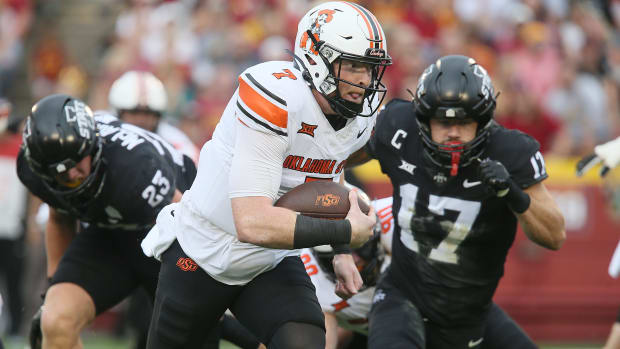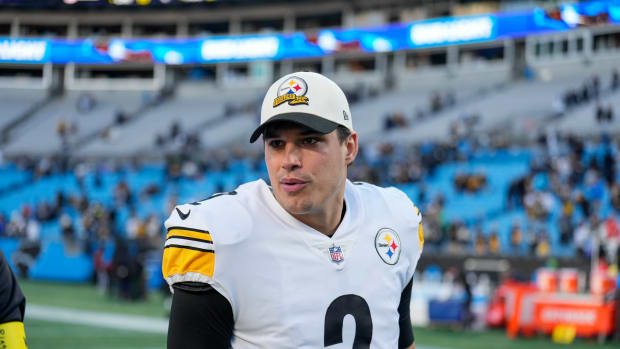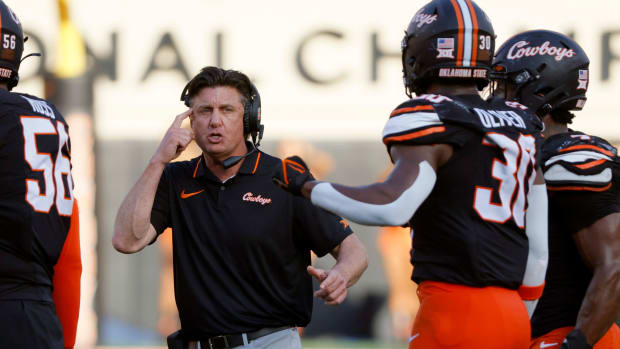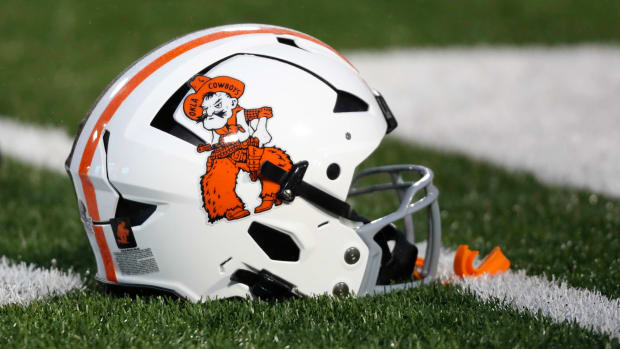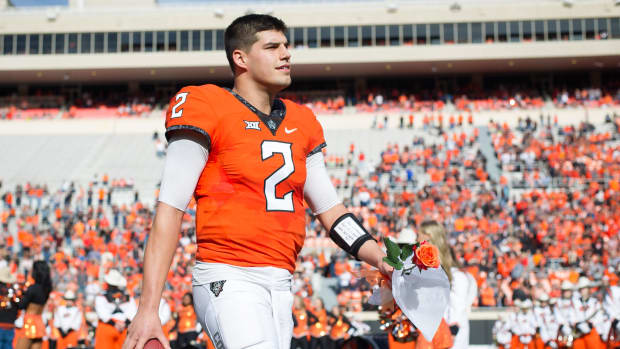Mike Holder Talks Oklahoma State Budget, Football Necessity, and More with Oklahoma State Alumni
STILLWATER -- Oklahoma State athletic director Mike Holder is no different than any of his counterparts and contemporaries this week that have through surveys, teleconferences, and virtual meetings on the internet spoke of the danger that the COVID-19 pandemic has created for college athletic programs and how the absence of a football season would make it nearly impossible for even the most financially robust of athletic departments.
Holder was a special and solo guest on the Oklahoma State Alumni Association program Friday with the Family. Oklahoma State University graduate and OState TV host and reporter Julia Benbrook did an excellent job with the interview.
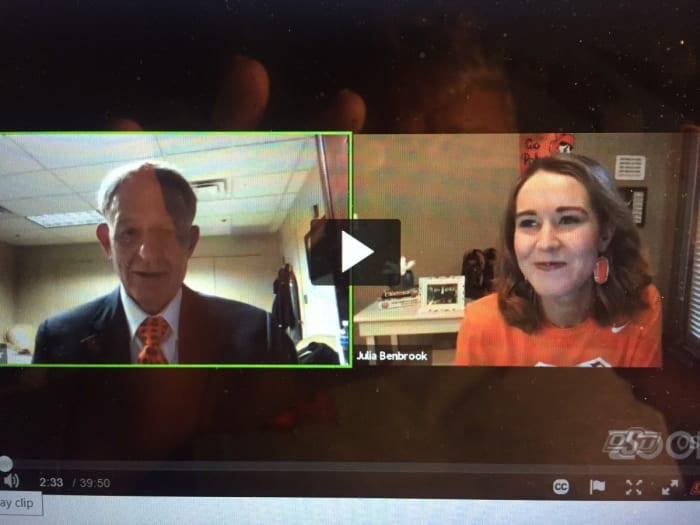
Oklahoma State athletics director Mike Holder with Julia Benbrook on The OSU Alumni Assocation Friday with the Family Program.
Robert Allen - Pokes Report publisher
The Vice-President for Athletics and Athletics Director at OSU, Holder spoke extensively of the events in Kansas City at the Big 12 Basketball Tournaments that served as the precursor to end of college basketball season and then the conclusion of all college sports for the 2019-2020 school year. He talked about missing huge events like the grand opening of O'Brate Stadium and the hosting of the NCAA Division I Men's and Women's Tennis Championships.
Holder, sitting in his office where he said he still goes with the rest of the athletic department staff working from home, voiced his support again of extending the eligibility of all spring athletes that just saw most of their season cancelled. He said as athletic director it would be his responsibility to find a way to fund those scholarships, which the NCAA Division I Council left at the discretion of the schools.
"Regardless of the finances, it was the right thing to do," Holder said of adding a year to all the spring athletes eligibility.
His most directive comments came down to budget and football. It has been the national topic of the week in college athletics.
"I'm not worried too much about the NCAA revenue (shortage from this year) but I'm worried more about the revenue that football brings in for our University," Holder said in opening up the financial discussion with regards to the COVID-19 pandemic.

Mike Holder spoke his mind on the future past coronavirus and the need of people to be strong and ready to battle.
Pat Kinnison - Pokes Report chief photographer
"Just round numbers for our fan base and everybody that is out there listening," Holder continued. "This last year our budget was about $85-million. So, how do you get to $85-million, in round numbers, I think our allocation from the Big 12 or this last year, I'm talking about fiscal year 2020, the distribution coming from the Big 12. I think we'll be pretty close to whole on that. It is going to be about $40-million and then we may get or generate about $37-million on game days from football. That is our season ticket sales, donor seating, that is our club seats, that's our suite sales.
"You know we have 123 suites at Boone Pickens Stadium and back in 2000 we had zero. Who would have thought that, dreamed it and that we could sell them all. Boone Pickens did."
The math is easy now. Holder is saying that Oklahoma State, who has stayed just a little in the black in recent years when the athletic department accounting is finished, makes a little over 90 percent of it's annual budget through Big 12/NCAA revenue distribution, the biggest chuck of which is football television revenue, and football revenue directly at Oklahoma State. The easy round numbers of $77-million out of the $85-million total.
I'm concerned about football," Holder said point blank. "We need to play football this fall and if we don't play football this fall I'm not sure there is an athletic director in America that can put those financial pieces back together and come up with an athletic department."
In order to play football, Holder says the country needs to get back to work. He said the country will need to get comfortable being around each other again. Although, he did acknowledge that perhaps, games could be played with limited or restricted crowds or even empty stadiums, but he believes they need to be played on time, with the regularly scheduled games starting in September.
"We have to stand up and fight as a country against this menace (coronavirus)," Holder stated sounding like he was giving a pep talk. "Every able bodied citizen needs to get back up and running. To play football, in my mind, this fall we have to be able to test our athletes, coaches, support personnel and know we have a safe group of people that are associating with one another.
If the games were played without spectators or limited numbers of fans in attendance then the schools could still reap the television money for college football which is extensive.
"If we can get to that test then we can quarantine ourselves on campus and get ready to play the football season," Holder continued. "Everyone needs to start thinking and talking about playing football in September like it is scheduled right now. I don't think delays are the solution. Everything is predicated on the virus and our economy and getting our country back to work."
Holder spoke of other items, Eddie Sutton getting into the Basketball Hall of Fame, student-athletes keeping their focus this spring on online classes, and coming up with a fitting grand opening now for O'Brate Stadium, but it is understandable that Holder was most passionate about football. It is the financial life blood of Oklahoma State and just about every other Power Five athletic department continuing to exist in any semblance of the way they have been existing in the last several decades.
